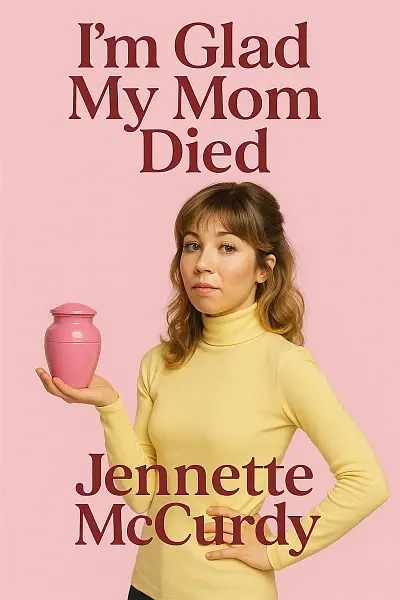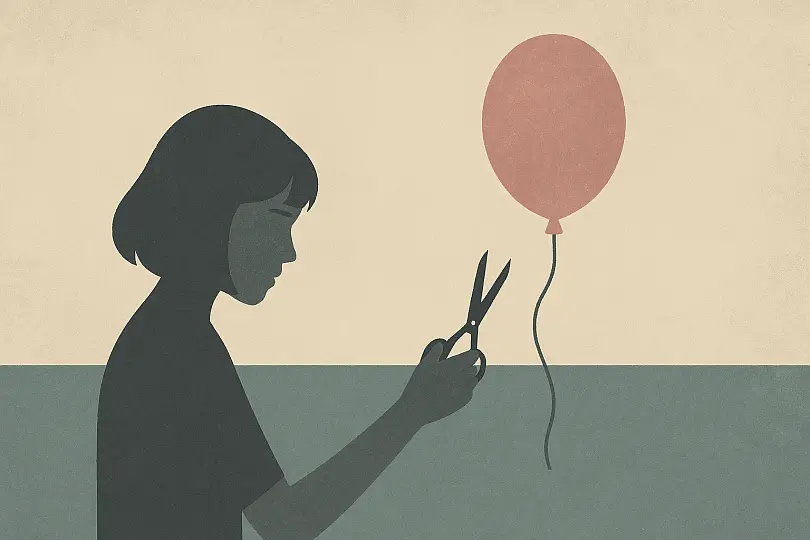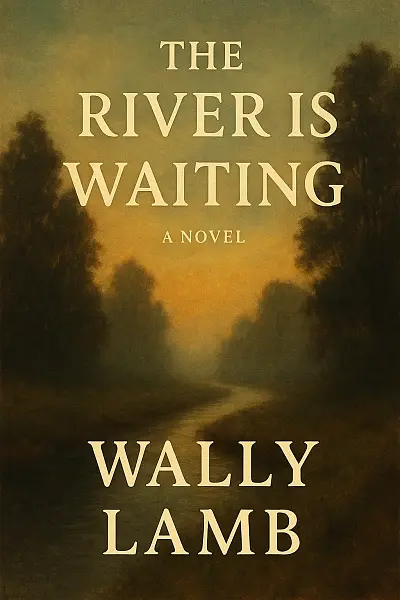
I’m Glad My Mom Died
by: Jennette McCurdy
Jennette McCurdy grows up in the pressure cooker of Hollywood, pushed by her intensely controlling mother to become a child star, even when it means sacrificing her own happiness. Her desire to please her mom drives every decision, especially as she faces strict diets, relentless scrutiny, and the never-ending search for her mom’s approval. Fame arrives with iCarly, but so do spiraling eating disorders, anxiety, and a life she never really chose. When her mother’s illness shakes her world, Jennette starts to question if she can finally claim her own voice.
Told with dark humor and searing honesty, this memoir’s raw vulnerability feels both heartbreaking and brave.
"Freedom begins when you allow your own voice to be louder than the one that taught you to silence it."
Let's Break This Down
The Author's Voice
Atmosphere
- Raw, confessional, and immersive: The book pulls you right into the world of Hollywood childhood, the chaos of family life, and the emotional turbulence beneath the surface.
- Tense yet darkly funny: Even the heaviest moments are laced with biting wit and self-awareness—there's both vulnerability and a sardonic edge throughout.
- Unflinchingly intimate: Expect a lived-in, sometimes claustrophobic feeling, as if you’re reading someone’s private journal—awkward, tense, but impossible to look away.
Prose Style
- Direct and punchy: Sentences are short, crisp, and cut to the bone. Jennette never over-explains; she loves the power of restraint.
- Dark humor: There’s an undercurrent of irony woven into even the most disturbing admissions, adding both levity and tension.
- Conversational yet precise: The writing feels like a friend confiding in you at 2am—unfiltered, witty, and sharp, but never messy or unfocused.
- Vulnerable and honest: The language is simple but emotionally charged, with an authenticity that makes every confession hit harder.
Pacing
- Effortlessly brisk: Chapters are tight, scenes shift quickly, and there’s little room for pause—each section propels you forward, hungry to know what comes next.
- Alternates intensity: Heavy, emotional moments are often followed by wry observations or comic relief, keeping the book from feeling weighed down.
- Snapshot storytelling: The narrative is built from vivid vignettes that zoom in on formative moments, skipping over unnecessary details and focusing only on what matters most.
Mood and Feel
- Bittersweet honesty: There’s a palpable tension between pain and humor, heartbreak and empowerment. The rollercoaster of emotion feels both cathartic and invigorating.
- Relatable, even when shocking: The candidness invites empathy, making the reader feel seen, even if the specifics are extraordinary.
- Unvarnished, modern, fearless: The overall mood is daringly self-aware, almost inviting readers to laugh and cry at the sheer absurdity of growing up in the spotlight.
What to Expect
Get ready for bold, fast-paced memoir writing that doesn’t flinch from pain, isn’t afraid to laugh at itself, and carries you through its story with both hands—one offering honesty, the other, dark humor. It’s a reading experience that feels both contemporary and deeply, achingly personal.
Key Moments
- Brutally honest confessions about toxic Hollywood motherhood
- Harrowing audition scenes that blur childhood and career
- Disarming humor—painful, punchy, and unfiltered
- Relentless pursuit of perfection, driven by a mother's obsession
- Food struggles and hidden eating disorders—starkly rendered
- Bittersweet bond with Miranda Cosgrove that offers rare warmth
- Raw letters to her mom that will leave you gutted
Plot Summary
I’m Glad My Mom Died follows Jennette McCurdy’s life from early childhood through young adulthood, charting her tumultuous relationship with her abusive, controlling mother. As a child star, Jennette is pushed into acting against her own wishes, experiencing eating disorders, anxiety, and manipulation from both her mother and the entertainment industry. The story intensifies as Jennette’s mother's cancer worsens, and Jennette struggles with guilt, self-loathing, and her own complicit patterns of disordered behavior instilled by her mom. After her mother’s death, Jennette is forced to confront years of trauma, discovering the freedom and healing that can come with setting boundaries and seeking therapy. The memoir concludes with Jennette’s gradual journey toward reclaiming her sense of self and embracing a life not defined by her mother’s expectations or approval.
Character Analysis
Jennette McCurdy emerges as a deeply vulnerable and honest narrator, struggling with the weight of people-pleasing, guilt, and emotional abuse. Over the course of the memoir, she transforms from a child desperate for her mother’s love and approval into a young woman who must face the hard truths of her past in order to heal. Her mother, Debra McCurdy, is portrayed as both needy and manipulative—driven by her own unfulfilled dreams and wielding her daughter’s career as a means to personal validation. The secondary figures, like Jennette’s brothers and various industry adults, offer glimpses into the systemic pressures facing child stars and the varying degrees of complicity from those around her.
Major Themes
One major theme is parental abuse and the myth of the perfect mother, as Jennette exposes the harsh realities hidden behind her mother’s public façade. Issues of control and autonomy permeate the memoir, with Jennette battling to assert her own desires in the face of relentless pressure and manipulation. Identity and healing are explored as she slowly uncovers who she is beyond the roles forced upon her, embracing therapy and self-reflection. The book also tackles disordered eating and mental health, offering a raw portrait of how trauma manifests both psychologically and physically.
Literary Techniques & Style
Jennette McCurdy’s style is conversational and darkly humorous, blending heavy topics with wit and sharp honesty. The narrative is structured with short, punchy chapters that mimic the fragmented nature of memory and trauma, often using childlike tone to drive home the innocence lost. Symbolism is evident in Jennette’s eating disorders, which stand for the larger issue of autonomy and bodily control, while her mother’s hospital room scenes act as metaphors for stasis and transition. Irony and juxtaposition are key techniques—especially in pairing the book’s provocative title with heartfelt moments of vulnerability and grief.
Historical/Cultural Context
Set mainly in the early 2000s Hollywood child star landscape, the memoir depicts the behind-the-scenes reality of Nickelodeon and the broader entertainment industry’s exploitation of young talent. The book also reflects evolving conversations around mental health, parent-child dynamics, and the cost of fame, resonating with the growing #MeToo and childhood stardom reckoning. It captures the shifting cultural attitudes toward celebrity, privacy, and the power dynamics inherent in family and media spaces.
Critical Significance & Impact
I’m Glad My Mom Died has been lauded for its raw honesty, humor, and bravery in tackling taboo subjects such as parental abuse, eating disorders, and the dark side of child stardom. It sparked widespread discussion about the long-term consequences of pushing children into fame, and the complex feelings often masked by social expectations around mothers. Its continued bestseller status and strong word-of-mouth show its resonance as a cultural touchstone, especially for readers navigating their own family traumas and recovery journeys.

Breaking free from trauma—with raw humor and fearless honesty
What Readers Are Saying
Right for You If
If you’re into raw, real-life memoirs that dig deep into complicated family stuff and the messiness of growing up in the spotlight, “I’m Glad My Mom Died” seriously delivers. This one’s totally for you if you love:
- Celebrity memoirs with a little extra honesty (think way more than just “How I became famous” stories)
- Dark humor that’s actually laugh-out-loud but also brutally honest
- Books about mental health, childhood trauma, and messy mother-daughter relationships—with zero sugar-coating
- Stories that aren’t afraid to go there, even if “there” is uncomfortable
If you binge tell-alls from celebs like Jeanette Walls or Tara Westover and appreciate people speaking their truth, flaws and all, this is definitely worth your time. Fans of memoirs that break all the usual rules—or just want something painfully human—will get a lot out of it.
But honestly? If you’re looking for a light, uplifting read or you’re sensitive to topics like eating disorders, emotional abuse, or grief, you might want to skip this one or at least be ready for some pretty heavy content. Likewise, if you typically prefer happy family stories or straightforward self-help books, this might hit a little too hard.
Basically—if you like your memoirs raw, brutally honest, and darkly funny, you’ll probably tear through this in a weekend. If you need something a bit more gentle or feel-good, maybe save it for another time.
What You're Getting Into
Get ready for a raw and unforgettable memoir as Jennette McCurdy—former Nickelodeon star—shares her powerful, darkly funny story growing up in the spotlight under the intense grip of her complicated mother.
At its heart, this book dives deep into McCurdy's struggle to balance her Hollywood career and her desire for autonomy, while dealing with the heavy expectations and emotional rollercoaster of her family dynamics.
You’ll find candid storytelling, biting humor, and plenty of heart as Jennette navigates identity, resilience, and ultimately, self-acceptance.
Characters You'll Meet
-
Jennette McCurdy: Raw, candid narrator who grapples with childhood stardom, trauma, and the complexities of her relationship with her mother. Her journey toward self-acceptance and healing is the emotional heart of the memoir.
-
Debra McCurdy (Mom): Overbearing, manipulative mother whose obsessive control over Jennette shapes much of her daughter’s pain and struggle. Her influence drives the book’s central conflict.
-
Mark McCurdy (Dad): A largely passive figure, often absent both physically and emotionally. His inability to intervene or support Jennette adds to her sense of isolation.
-
Brothers (Scott, Dustin, Marcus): Supporting figures who offer glimpses of normalcy and contrast to Jennette’s experience. Their roles highlight family dynamics and the various ways siblings cope within a dysfunctional household.
-
Hollywood/Industry Figures: Collective presence representing the pressures and demands of child stardom. Their actions—and sometimes indifference—underscore the exploitative nature of the entertainment industry as McCurdy describes it.
More Like This
If you were gripped by the raw honesty in Educated by Tara Westover, Jennette McCurdy’s I’m Glad My Mom Died strikes a similarly unfiltered tone—laying bare the turmoil and complexity of growing up under a controlling figure, but with a darker, acerbic wit that’s all her own. Where Educated centers on breaking from a survivalist upbringing, McCurdy’s memoir spotlights the uniquely twisted world of child stardom—so fans of memoirs that dive deep into family dysfunction will find a familiar, if much more sardonic, terrain.
There’s also a clear kinship with Crying in H Mart by Michelle Zauner, especially in the way both authors navigate the tangled webs of grief, damaged maternal bonds, and forging identity out from under an overbearing presence. McCurdy, though, swings for catharsis through biting humor and bracing confessions, so if Zauner’s delicate heartbreak hit home, McCurdy’s sharp-edged vulnerability might surprise you with how much it resonates.
In a totally different medium, the memoir brings to mind the searing mother-daughter dynamics from the film Lady Bird, but replaces cinematic nostalgia with the sharp-edged truth of Hollywood childhood. Both works explore young women wrestling with suffocating love and longing for autonomy, but McCurdy’s real-life account delivers an even more harrowing—and, at times, darkly comedic—look at growing up under impossible expectations.
Critic's Corner
What does it mean to own your story when that story is defined by relentless exploitation and the suffocating expectations of someone you love most? I’m Glad My Mom Died grabs you with its unapologetically shocking title, but it’s the searing vulnerability and razor-sharp wit of Jennette McCurdy’s memoir that lingers. Here, McCurdy invites readers into the claustrophobic, surreal world of child stardom—one tightly choreographed by her mother’s obsessions and betrayals—while asking with aching honesty: What happens when you stop living for someone else, and finally claim your own life?
McCurdy’s writing electrifies on the sentence level. She unspools the most painful of memories—disordered eating, unwanted stardom, parental manipulation—with an understated, crystal-clear style that swaps self-pity for black humor and biting irony. The narrative cleverly adopts a child’s voice in early chapters, the tone matter-of-fact even when recounting jaw-dropping parental overreach (“showered by Mom until sixteen”), then matures in tandem with McCurdy’s growing awareness. Dark punchlines land like gut-punches, yet laughter bubbles up amid despair. Her pacing is tight: scenes spill out in taut, snapshot-like vignettes, never lingering unnecessarily or wallowing in melodrama. Dialogue sparkles with specificity—her mother's voice, alternating between cajoling and cutting, haunts the page. There’s an economy in McCurdy’s prose that feels both cinematic and starkly confessional; she trusts readers to connect dots and sit with discomfort. Though the book leans heavily on anecdote, the craftsmanship is evident in her careful shaping of memory, the rhythm of revelation, and the disarming honesty that refuses to sanitize the unseemly.
At its heart, this is a memoir about toxic parenthood and the treacherous pursuit of ‘success’ at the expense of selfhood. McCurdy doesn’t just expose her mother’s transgressions—she interrogates the machinery that let it happen: the cult of celebrity, the willful blindness of Hollywood, the hunger for female likability at all costs. Her depiction of eating disorders and addiction is raw, never exploitative, and she resists easy redemption arcs. The book is particularly resonant in an era increasingly skeptical of “momager” mythologies and the commodification of childhood. McCurdy’s journey toward autonomy—halting, messy, and never quite linear—mirrors a broader cultural push toward authenticity over performance. By pulling back the curtain on the cost of people-pleasing and the grief of untangling from a loved abuser, she opens rare space for conversation around cycles of familial dysfunction, mental health, and the power of choosing one’s own narrative.
Within the canon of Hollywood memoirs, I’m Glad My Mom Died is a revelation—less a cautionary tale than an act of literary rebellion. Unlike many celebrity tell-alls, McCurdy subverts expectation by elevating the prose and refusing nostalgia. Fans of Tara Westover’s Educated or Augusten Burroughs’ Running with Scissors will find a similarly arresting blend of heartbreak and humor, but McCurdy’s showbiz backdrop and refusal to tie things up neatly set her apart.
Of course, the deliberate bluntness can sometimes feel abrasive, and the brevity of some chapters leaves emotional threads tantalizingly unresolved. But that raw, fractured style feels true to her experience—unfinished, perpetually in process. This is a brave, one-of-a-kind memoir that refuses easy answers and insists on telling the whole, harrowing, laugh-out-loud truth. For anyone grappling with impossible expectations or the tangled legacy of love gone wrong, this book matters—right now.
Community Thoughts
Okay, but that part where she cleans out her mom’s storage unit? Haunting. The smell, the memories, the dread. It stuck with me for days and I couldn’t stop picturing it. Why is this book so vivid?
the way jennette describes her mom in those therapy sessions? chills. i kept rereading the part with the pink ice cream, couldn’t shake it. honestly, i’ll be thinking about that scene for weeks.
Honestly, that part where Jennette describes her mom’s manipulation hit way too close to home. I couldn’t stop thinking about it all night. The raw honesty and pain just lingered. Still can’t shake it.
whoa, that scene with the pink frosted cupcakes and her mom’s overwhelming presence? it stuck in my head for days. couldn’t shake how much it said with so little. never thought a dessert could feel so tragic.
I picked this up on a whim and now I can't stop thinking about that scene with the pink lemonade. Seriously, the detail, the tension, it’s stuck in my head like a song you can’t shake.
Leave Your Review
Local Take
Why It Matters
I’m Glad My Mom Died by Jennette McCurdy strikes a powerful chord in the US, where conversations around trauma, mental health, and toxic family dynamics have grown bolder, especially post-#MeToo and amid rising discussions about child stardom.
-
The book’s themes recall real-world stories of Hollywood’s troubled child actors—think the tabloid-fueled struggles of stars like Britney Spears or Drew Barrymore. McCurdy’s brutal honesty about exploitation, disordered eating, and parental control taps into ongoing movements for personal agency and therapy culture in the US.
-
American values of individualism and self-expression directly align with McCurdy’s journey, but her rejection of filial piety challenges deep-rooted ideals about respecting one’s parents—adding layers of complexity.
-
Plot elements like confronting parental abuse or choosing found family resonate deeply in a country fascinated by memoirs of survival and healing, echoing the confessional tradition of writers like Maya Angelou and Mary Karr, yet clashing with older, more private family narratives.
It’s bold, raw, and perfectly tuned to a culture reevaluating whose pain gets heard—and why.
Food for Thought
Controversies:
Some critics have raised concerns about the book's candid portrayal of family abuse and trauma, sparking debates around the ethics of sharing such personal stories involving real people. Additionally, there's been cultural discussion about how the memoir challenges traditional views of parent-child relationships and the responsibilities of child stardom.
Like what you see? Share it with other readers







